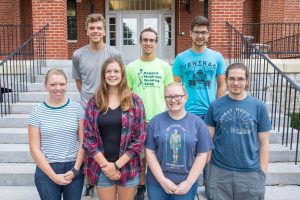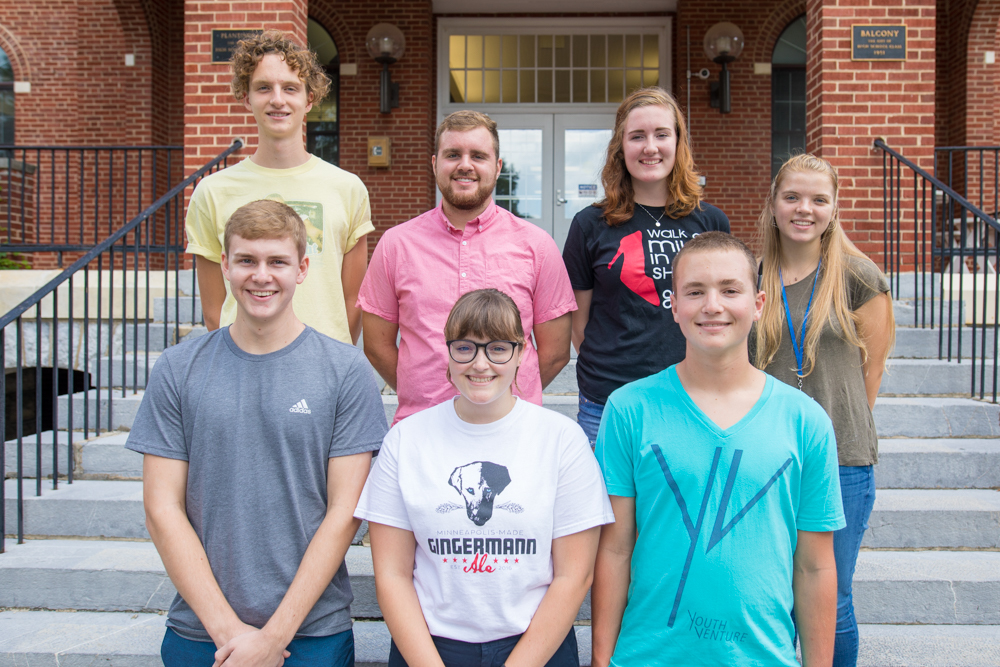Seven first-year Eastern Mennonite University students studying in science, technology, engineering and math (STEM) fields have been awarded scholarships funded by a National Science Foundation grant.
The $600,000 grant will also fund seven more students next year, as well as support services and activities for students both years. The scholarships may be renewed for up to four years for eligible students.
The grant recipients are members in a cohort in EMU’s STEM Scholars Engaging in Local Problems (SSELP) program, which fosters real-world impact through socially engaged learning.
This year they come from six states, and as awardee Nicole Miller said, they are looking to EMU to prepare them for jobs that “will make a difference.”
“There is such a strong community, you can immediately feel it when you step on campus,” she said. “Each professor and staff member are here to help you and want to see you succeed. The beauty of the surrounding mountains is also a bonus!”

Program participants are paired with mentoring juniors and seniors majoring in the same areas, said Professor Tara Kishbaugh, who chairs the biology and chemistry departments. “The combination of intentional community and informally shared insights, such as into the policies and culture of the STEM departments, often helps student engage more fully in the first year of college,” she said.
2018 recipients
Wade Banks (Basye, Virginia) realized in high school physics class that engineering would be both “a job that I would enjoy and one that would allow me to reach my goal of reducing human impact on the environment,” he said. At EMU, he is majoring in engineering with minors in environmental sustainability and peacebuilding – to “be a part of the generation of scientist that launches the world into the age of renewable energy.”
Jacob Horsley (Johnstown, Pennsylvania) was part of a high school STEM competition team that designed a walker that enabled climbing stairs. He chose EMU for its “focus on community, sustainability and cultural experiences,” he said. He is studying mechanical engineering, with minors in Spanish and environmental sustainability.
Ally Mankamyer (Shippensburg, Pennsylvania) is a math major prepping to work “somewhere in the math field making life better for the less fortunate,” she said. She is “excited to learn about math that I never even knew existed, and to be able to form relationships with some pretty awesome peers, faculty, and staff.”
Nicole Miller (Plymouth, Minnesota) loved her high school chemistry classes – and that’s her major at EMU. “I thoroughly enjoyed the content and I found a sense of community surrounded by like-minded individuals,” she said. “Chemistry homework didn’t feel like a job, unlike my other class. It was, and still is, fun!”
Jacob Myers (Pettisville, Ohio) loves nature and especially birds – and realized in his senior year of high school that “this hobby has the potential to be a job,” he said. He’s double majoring in environmental sustainability and Bible, with a minor in Spanish, and plans to be a missionary, field researcher or park ranger.
Anna Paetkau (Goshen, Indiana) attended a marine biology trip in her final two years of high school that “solidified my love for the ocean, biology and research,” she said. Now studying biology with minors in Spanish and honors, she is looking forward to conducting research with her professors. Her career goals include researching how changes in temperature and salinity affect marine organisms.
Andrew Schunn (Phoenix, Arizona) is studying mechanical engineering, in part after being inspired by a high school calculus teacher who described compelling career choices in engineering. He has appreciated the “extremely nice” people and small class sizes.
